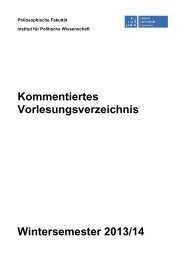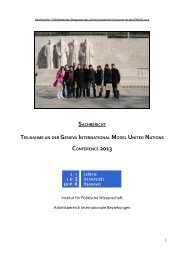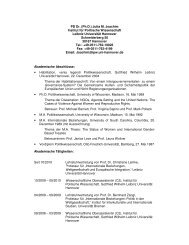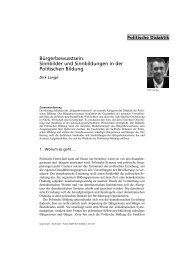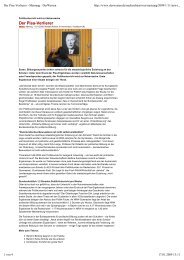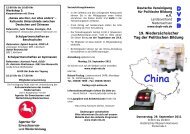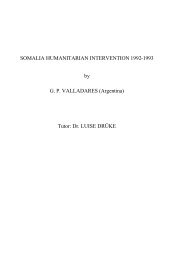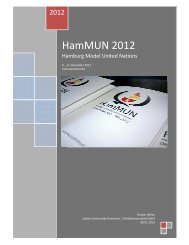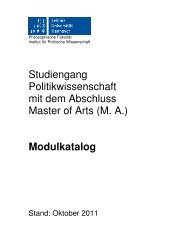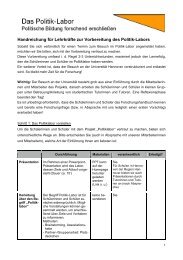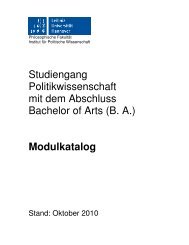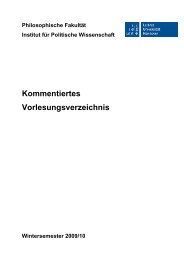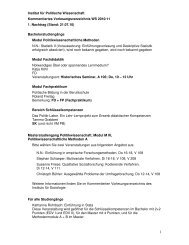Preventive Action for Refugee Producing Situations
Preventive Action for Refugee Producing Situations
Preventive Action for Refugee Producing Situations
Create successful ePaper yourself
Turn your PDF publications into a flip-book with our unique Google optimized e-Paper software.
152 Chapter 4<br />
request by Iraq that stated a threat to peace due to the build up of Western<br />
military <strong>for</strong>ces. If the Security Council is dealing with a matter, then the<br />
General Assembly does not deal with it. 350<br />
As already mentioned, the basis of Article 99 of the UN Charter, the<br />
Secretary-General may bring implicitly or explicitly to the attention of the<br />
Security Council, any matter which in his opinion may threaten the<br />
maintenance of international peace and security. On the basis of Article 11.3<br />
of the UN Charter, the General Assembly may call to the attention of the<br />
Security Council situations which are likely to endanger international peace<br />
and security.<br />
Decisions regarding conflict management are made inter alia as <strong>for</strong>eseen<br />
in Articles 40, 41, 42, 44, 48, 50 of the UN Charter. Both the Secretary-<br />
General and the Security Council may take action to:<br />
i) review<br />
ii) intercede<br />
iii) act<br />
in order to attempt conflict management. The system of conflict management<br />
is yet to be further developed and strengthened. The period during the Cold-<br />
War impeded the implementation of an effective system.<br />
A pragmatic approach prevailed so far, where required, when elements<br />
<strong>for</strong> timely and effective decision-making procedures were weak or lacking all<br />
together.<br />
3. Conflict prevention facilities including early warning <strong>for</strong> conflict<br />
management/conflict prevention and <strong>for</strong> humanitarian matters:<br />
In the late 1950's, without previous discussion, Dag Hammarskjold began<br />
to practise preventive diplomacy by means of his various practical<br />
innovations, such as "UN presences" and the dispatch of personal<br />
representatives to potentially dangerous areas". 351<br />
In other, less politically sensitive areas, the United Nations started to<br />
apply early warning and related concepts, while the United Nations Statistical<br />
Office (UNSO) and the Department of International Economic and Social<br />
Affairs (DIESA) developed databases <strong>for</strong> economic <strong>for</strong>ecasting and reporting,<br />
identifying social and environmental indicators, and establishing the issuance<br />
of projections as a regular practice of their work (as do the World Bank and<br />
IMF). In the early<br />
___________________<br />
350 Interview with a senior official of the UN Secretariat in New York, 2 April 1992.<br />
351 Brian Urquhart, Hammarskjold. New York: Harper & Row, 1972, p. 258.<br />
New Approaches and Policies 153<br />
1970s, the United Nations Environmental Programme (UNEP) established<br />
the Earthwatch, and the Food and Agricultural Organization (FAO) set up<br />
the Global In<strong>for</strong>mation and Early Warning System (GIEWS) in the mid<br />
1970s. 352<br />
Finally, in 1981, Prince Sadruddin Aga Khan recommended an early<br />
warning system in the humanitarian field and one year later Perez de<br />
Cuellar, the then Secretary-General in his 1982 Annual Report, promised<br />
to develop in the political arena, a wider and more systematic capacity <strong>for</strong><br />
fact-finding in potential conflict areas. On the request of the Secretary-<br />
General, the Department of Political and Security Council Affairs<br />
(PSCA), following the 1982 Annual Report, set up a special service to<br />
monitor new agencies' daily releases, and to prepare immediate summaries<br />
of these and other reports in the international press.<br />
The real breakthrough followed, however, with the UN financial crisis<br />
and the increasing refugee emergencies. This led the General Assembly to<br />
appoint the so-called Group of 18 to study the efficiency of the United<br />
Nations. Its recommendations of 1986 were directed at streamlining,<br />
rationalizing, and cutting of duplications in the Secretariat. 353 In the same<br />
year another initiative, the Group of Governmental Experts to Avert New<br />
<strong>Refugee</strong> Flows, recommended in its final report to the Secretary-General<br />
"to ensure timely and fuller in<strong>for</strong>mation on potential refugee situations". 354<br />
The establishment of the Office <strong>for</strong> Research and Collection of<br />
In<strong>for</strong>mation (ORCI) in March 1987 is one of the direct results of the two<br />
groups' recommendations. The Secretary-General took this first<br />
institutional measure to "provide early warning of developing situations<br />
requiring the Secretary-General's attention". 355 and to centralize several<br />
functions from different services in this new office.<br />
ORCI's function was intended to enable the Secretary- General to<br />
________________________<br />
352 Tapio Kanninen, "The Future of Early Warning and <strong>Preventive</strong> <strong>Action</strong> in the<br />
United Nations", Occasional Papers Series, Number V, The Ralph Bunche<br />
Institute of the United Naüons, New York, May 1991, pp. 2-3.<br />
353 UN Doc. 49 (A/41/49), 15 August 1986. Report of the Group of High-Level<br />
Intergovernmental Experts to Review the Efficiency of the Administrative and<br />
Financial Functioning of the United Nations, General Assembly Records; p. 12:<br />
Recommendation 18.<br />
354 UN doc. A/41/324, 13 May 1986. Note by the Secretary-General. Report of the<br />
UN Group of Governmental Experts on International Co-operation to Avert<br />
New Flows of <strong>Refugee</strong>s, p. 18.<br />
355 UN doc. ST/SGB/225, 1 March 1987: Office <strong>for</strong> Research and the Collection of<br />
In<strong>for</strong>mation, p. 1.<br />
154 Chapter 4 provide the Security Council with early in<strong>for</strong>mation, and thereby play a<br />
more central and effective role in the prevention of conflicts and the



